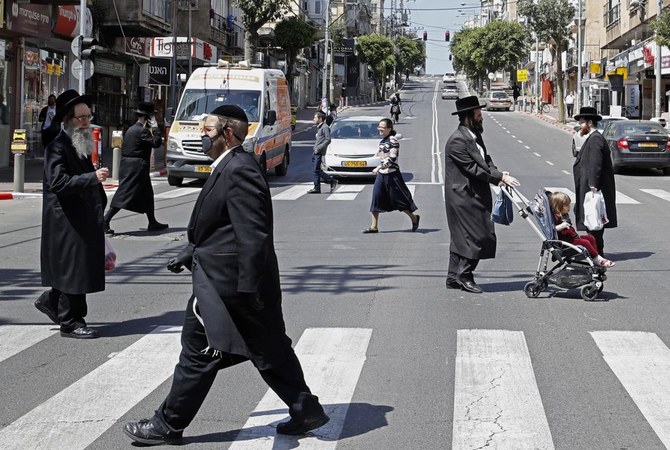JERUSALEM: Prime Minister Benjamin Netanyahu on Friday gave the green light for soldiers to be deployed in a mostly ultra-Orthodox Jewish city seen as the center of Israel’s novel coronavirus outbreak.
“In light of the special situation in Bnei Brak following the restrictions due to the coronavirus, the IDF (army) will immediately present the necessary civil assistance to Bnei Brak municipality in fulfilling its responsibilities,” Netanyahu’s office said after talks with security and health officials.
Authorities have enforced restrictions on access to Bnei Brak, a majority ultra-Orthodox city near Tel Aviv that is home to around 200,000 people.
More than 7,000 cases of COVID-19, including 36 deaths, have been officially declared in Israel.
According to local media, half of those infected are ultra-Orthodox Jews, a community which represents only around 10 percent of the Israeli population.
Many ultra-Orthodox Jews have refused to comply with confinement measures and social distancing.
This week has seen tense exchanges as police stepped up patrols of ultra-Orthodox neighborhoods that have become virus hot spots.
Army spokesman Jonathan Conricus said the military would deploy 800-1,000 soldiers in Bnei Brak to “assist” local authorities “because of the severity of the situation there and because of the relative lack of implementation of health ministry instructions.”
Soldiers will help distribute food and medicine and assist with the evacuation of people with virus symptoms, Conricus told an online conference call with reporters.
He said the army would also seek to ensure health messages were reaching the ultra-Orthodox community.
Motti Ravid, director of Mayanei Yeshua hospital in Bnei Brak, told AFP earlier this week that with Internet and television prohibited in the ultra-Orthodox community on religious grounds, government directives took a long time to filter through.
Even for those using mobile phones, access to the Internet and most message services is blocked, shutting them off from the main form of communication used by the health ministry.
Conricus said soldiers would wear orange and most of them would not carry weapons.
He said he anticipated there would be misunderstandings and frustrations among the community, but “we are taking that into consideration.”
Netanyahu himself re-entered precautionary quarantine this week after Health Minister Yaakov Litzman, a leading member of the ultra-Orthodox community, tested positive for COVID-19.
Israel sends army to ultra-Orthodox city over coronavirus
https://arab.news/rzp9w
Israel sends army to ultra-Orthodox city over coronavirus

- Authorities have enforced restrictions on access to Bnei Brak, a majority ultra-Orthodox city near Tel Aviv
- Many ultra-Orthodox Jews have refused to comply with confinement measures and social distancing
Video shows armed men beating a Palestinian in West Bank

- The previous incident was in September and cost the business more than $600,000 as offices and facilities were damaged, he said
TEL AVIV: Dozens of masked men armed with sticks beat and injured a Palestinian in the Israeli-occupied West Bank when they attacked a plant nursery, according to people who saw the attack and video footage obtained by The Associated Press.
Video filmed by security cameras shows men dressed mostly in black, faces covered, with several hitting and kicking a man on the ground.
Two witnesses who are members of the family that owns the facility said Israeli settlers beat 67-year-old Basim Saleh Yassin as he was trying to flee the German-Palestinian-run nursery in the northern West Bank village of Deir Sharaf. Both spoke on condition of anonymity for fear of reprisal.
BACKGROUND
The attack is the latest in rising Israeli settler violence in the West Bank, where assaults increased during the Palestinian olive harvest in October and have continued.
Workers fled when they saw the settlers coming on Thursday but Yassin is deaf and couldn’t hear the warnings to leave, one family member said.
The witnesses said Yassin was in the hospital with broken bones in his hand and other injuries to his face, chest and back. Four cars at the nursery were burned.
The attack is the latest in rising Israeli settler violence in the West Bank, where assaults increased during the Palestinian olive harvest in October and have continued.
Israeli authorities have done little beyond issuing occasional condemnations of the violence.
Prime Minister Benjamin Netanyahu has called the perpetrators “a handful of extremists” and urged law enforcement to pursue them for “the attempt to take the law into their own hands.”
But rights groups and Palestinians say the problem is far greater than a few bad actors, and attacks have become a daily phenomenon across the territory.
Israel’s army said it dispatched soldiers to the Shavei Shomron junction — close to the area of Thursday’s attack — following reports of dozens of masked Israelis vandalizing property.
The army said it apprehended three suspects who were taken to police for questioning. It said security forces condemn violence of any kind.
According to one of the family members who own the nursery, it was the third time in a year that the facility was attacked.
The previous incident was in September and cost the business more than $600,000 as offices and facilities were damaged, he said.
In the video of Thursday’s attack, Yassin runs from a group of masked people before falling to the ground.
One man kicks him and another hits him twice with what appears to be a stick. Yassin stays on his knees as he’s struck again and then places his hands on the ground.
As the men are leaving, one kicks him in the head while others strike him again until he’s seen lying on the pavement.














